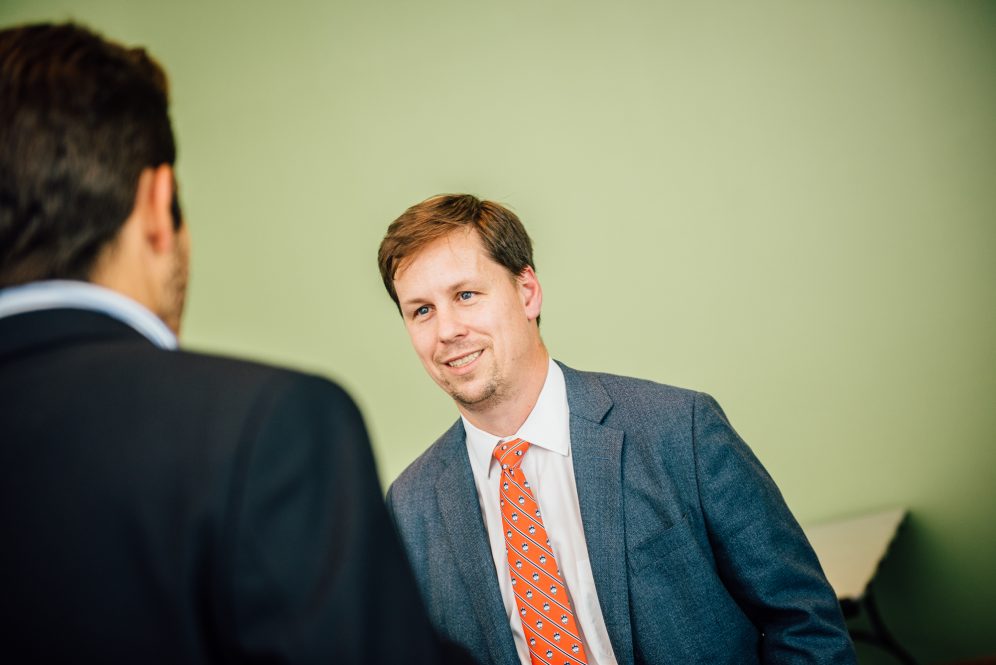David Noble has been on a Choose Your Own Adventure-style journey since he was a teenager.
At every page, he chose a new and exciting option, all of which have led him to working as an associate professor of management at the University of Connecticut and the inaugural director of the Peter J. Werth Institute for Entrepreneurship and Innovation.
“It chose me more than I chose it,” Noble says.
In high school, Noble lived in Finland to play hockey and go to school. This formative experience provided him not only with lifelong friends and memories, but an attitude which shuns asking the “what ifs” of life.
“If you’re willing to go live in Finland at 15, there’s not much you won’t try,” Noble says.
This attitude has served Noble well as he navigated his circuitous career path.
Finding Value
Noble worked as a securities lawyer for about five years, starting on Wall Street and later moving to North Carolina. After witnessing the terrorist attacks on Sept. 11, 2001, the day before he was supposed to start work, Noble realized he needed to make a change.
Learn what you want through trial and error and unrelentingly try to do it — David Noble
“I had more to contribute than moving paper from one side of the desk to the other,” Noble says. “I didn’t see a connection to how I was improving the world.”
After working as a lawyer for six years, Noble decided to pursue his Ph.D. Before then, he had only previously taken one business course, but his transition to academic began by earning his MBA at Elon University. He would go on to the University of Alabama and earn a Ph.D. in business management.
From early in his academic career, Noble knew he wanted to work with students.
“At the end of the day, it’s those connections,” Noble says. “I find that [interaction] to be what inspires me and makes me wake up and want to do my job.”
Noble says everyone, whether entrepreneur, researcher, or anything else, should spend time figuring out what they want to spend their lives doing even if their path isn’t linear, as was the case for him.
“Learn what you want through trial and error and unrelentingly try to do it, or life sucks,” Noble says. “I wake up and I’m happy. I know what I’m achieving and when I’m helping and that provides a lot of meaning.”
Keys to Success
Over the years, Noble has learned there are many factors that influence an aspiring entrepreneur’s success. Aside from curiosity, a strong work ethic, and a willingness to act, external factors also influence who succeeds.
One important variable is timing. Noble points to the example of Pets.com, a notoriously failed business that sold pet supplies online. While Pets.com failed in the early 2000s, businesses like Chewy, which perform the same services, are now thriving.
“Technology wins in the long run. The world evolves,” Noble says. “But it’s about the timing. In 2000, we didn’t want to buy our dog food on the internet.”
Another important factor is having insights about what makes one venture succeed and another fail.
“You need that set of experiences that allow for pattern recognition,” Noble says. “To me that’s more exciting – pulling those patterns out of the noise.”
Noble sees more connections between entrepreneurs and academic researchers than one would expect. Both go through an exhaustive process of trial and error, facing a slew of rejections until finally achieving the breakthrough they’ve waited for.
“Successful entrepreneurs were failed entrepreneurs until the moment they succeeded,” Noble says. “Any time you get rejected, that [failure] should be embraced as a learning moment.”
One of the greatest problems for academic researchers is that their research is often not successfully translated to the market. Noble recommends researchers, counterintuitively, should sell their technology as soon as possible.
“People like to tinker and toy and never go and sell,” Noble says.
For a product to be successful, it needs to not only be better, but provide enough value to incentivize people to replace their old product.
“People always think a better mouse trap sells, but it has to create more value,” Noble says.
Noble explains that most projects students create in his classes never become more than an assignment. But students can learn invaluable lessons about business beyond college when they decide their work can be more than just an assignment completed for a grade in a class.
There are infinite challenges in the world, it takes someone with the entrepreneurial drive to have an idea for a remedy and the courage to try it out, he says.
“You’re an eternal optimist while being a total pessimist at all times,” Noble says. “Everything’s always broken but you can always find a way to fix it.”
Working on the Edge of Technology
Noble doesn’t just teach; he does. He is currently working on a startup called GunClear. The company’s encrypted technology uses applied mathematics to determine if someone is in possession of a firearm legally while protecting the privacy of the owner.
This tool will be useful for collectors and competitive shooters who transport their firearms frequently. It may also benefit resellers who need to ensure they are not selling stolen weapons.
Due to legal ramifications, people often do not report their guns as stolen. GunClear hopes to remedy this underreporting problem by privately confirming, with a simple yes or no, if a gun is owned legally.

This technology also has implications for criminal justice as 56% of crimes committed with a firearm involve a stolen firearm according to the Bureau of Justice Statistics.
“There are very different political problems nobody has had the courage to solve,” Noble says. “We’re trying to use technology to do something that helps solve it.”
One of the greatest challenges Noble has encountered with this project stems from its novelty. Without a model to follow, this kind of cutting-edge technology is forging its own path.
“It’s hard to work with a development team at the bleeding edge of technology,” Noble says. “Nobody’s done this before.”
Just the Beginning
Noble is used to forging new paths. He was part of the inception of UConn’s Werth Institute in 2017. The Werth Institute provides students with interdisciplinary opportunities to learn about and practice entrepreneurship and innovation.
For Noble, one of the key values of Werth is its commitment to all UConn students, not just those in the Schools of Business or Engineering.
“We painted a vision of entrepreneurship that brought it to students regardless of what their major is,” Noble says.
While many students shy away from the idea of entrepreneurship as a career, the Werth Institute member programs provide transferable skills.
“We want to not only encourage young students to try entrepreneurship, but also provide them with the skills to be more dynamic employees,” Noble says.
The institute has the unique ability to see student startups at all stages. The faculty and advisors there can give precise advice about what students need to do to make their companies feasible.
Recent technological advances have helped to democratize entrepreneurship, which is a fundamental mission at Werth. Startups no longer need million-dollar computer setups as most people hold the power of a supercomputer in their hand.
“Students can build entire products in their dorm rooms by themselves,” Noble says.
These kinds of advances and the ever-expanding digital marketplace have made entrepreneurship a more accepted career.
Another key element of entrepreneurship is leveraging one’s network effectively. Noble is committed to building a strong UConn alumni network. By connecting with successful alumni, students see the possibilities they have as a UConn graduate.
“We really strive to build engagement between students and alumni like what exists at Ivy League institutions that have worked on this for generations,” Noble says. “We think that will be the key to taking UConn to a new level in the entrepreneurship space.”
Noble says through initiatives at the Werth Institute and the University more generally, UConn will become a global leader in entrepreneurship and innovation.
“There’s no doubt in my mind we’ll succeed, because I already see it coming,” Noble says. “We very clearly see this is just the beginning.”



